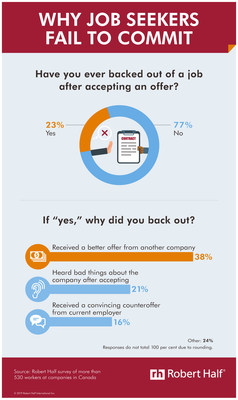Jillian Levick
Senior PR and Communications Manager
Robert Half Canada Inc.,
181 Bay Street, Suite 820,
Toronto, ON
M5J 2T3
www.roberthalf.ca
Press Releases
Read about our latest research, including results from our ongoing surveys of senior managers and workers, and company announcements.

TORONTO, May 15, 2019 /CNW/ - Employers take note: The hiring process doesn't necessarily end when a candidate accepts the offer, new research from global staffing firm Robert Half shows. In the survey, nearly a quarter of Canadian workers (23 per cent) said they have backed out of an offer after initially saying yes.

Workers were also asked, "Why did you back out of a job after accepting an offer?" Their responses:
For a better offer (pay) from another company | 38% |
Heard bad things about the company after accepting | 21% |
Got a counteroffer from current employer that convinced me to stay | 16% |
Other | 24% |
View an infographic of top reasons why candidates renege on job offers.
"While it may be a candidate's market, workers should remain tactful during the entire hiring process – even if they have a change of heart about the role," said David King, senior district president for Robert Half. "Ghosting on the company may seem like an easy way to avoid an uncomfortable conversation, but it's important for professionals to be upfront with the hiring manager about their intentions."
"It's never fun for an employer to hear that their top candidate no longer wants the position," King added. "But workers could potentially make things worse for themselves if they don't communicate clearly. Rejecting a job offer the wrong way can reflect negatively on you and follow you in future job searches."
Robert Half offers three tips for candidates who change their mind after accepting a job offer:
- Read the fine print. If you've signed a formal contract, make sure there aren't any stipulations in the document when it comes to backing out.
- Don't beat around the bush. Be forthcoming and tell the hiring manager, recruiter or human resources professional as soon as possible that you have decided to decline the offer.
- Exit gracefully. Apologetic and professional communication by phone or in person is typically the best way to handle the situation. Don't send a text message or email. Remember to thank those you met during the job selection process so you don't burn any bridges.
About the Research
The online survey was developed by Robert Half and conducted by an independent research firm. It includes responses from more than 530 workers 18 years of age or older and employed in office environments in Canada.
About Robert Half
Founded in 1948, Robert Half is the world's first and largest specialized staffing firm. The company has more than 300 staffing locations worldwide and offers job search services at roberthalf.ca. For additional career and management advice, visit the Robert Half blog at roberthalf.ca/blog.
SOURCE Robert Half Canada
